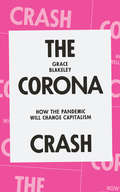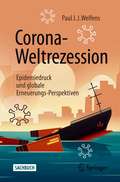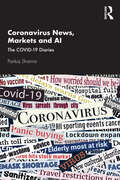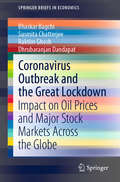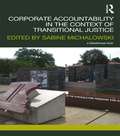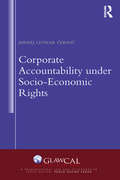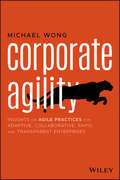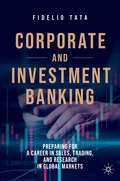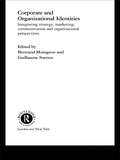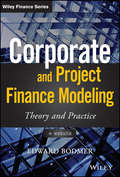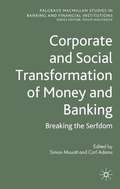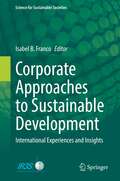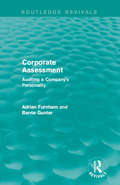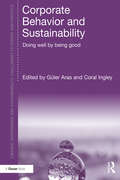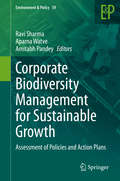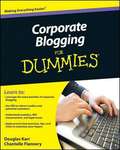- Table View
- List View
Cornwall, Its Mines and Miners
by J. R. LeifchildPublished in the year 1968, Cornwall, Its Mines and Miners is a valuable contribution to the field of Economics.
Corona Beer
by Rohit DeshpandeIn early June 1997, the CEO and vice chairman of Grupo Modelo were reviewing the performance of Corona beer in the U.S. market. Despite a much higher sales volume growth rate, Corona still trailed Heineken, the #1 imported beer brand in the U.S. market. Could Corona overtake Heineken and, if so, what marketing strategy changes needed to be made? Includes color exhibits.
Corona, Climate, Chronic Emergency: War Communism in the Twenty-First Century
by Andreas MalmWhat does the COVID 19 tell us about the climate breakdown, and what should we do about it?The economic and social impact of the coronavirus pandemic has been unprecedented. Governments have spoken of being at war and find themselves forced to seek new powers in order to maintain social order and prevent the spread of the virus. This is often exercised with the notion that we will return to normal as soon as we can. What if that is not possible? Secondly, if the state can mobilize itself in the face of an invisible foe like this pandemic, it should also be able to confront visible dangers such as climate destruction with equal force. In Corona, Climate, Chronic Emergency, leading environmental thinker, Andreas Malm demands that this war-footing state should be applied on a permanent basis to the ongoing climate front line. He offers proposals on how the climate movement should use this present emergency to make that case. There can be no excuse for inaction any longer.
The Corona Crash: How the Pandemic Will Change Capitalism (CORONAVIRUS PAMPHLETS)
by Grace BlakeleyFree market, competitive capitalism is dead. The separation between politics and economics can no longer be sustained.In The Corona Crash, leading economics commentator Grace Blakeley theorises about the epoch-making changes that the coronavirus brings in its wake. We are living through a unique moment in history. The pandemic has caused the deepest global recession since the Second World War. Meanwhile the human cost is reflected in a still-rising death toll, as many states find themselves unable—and some unwilling—to grapple with the effects of the virus. Whatever happens, we can never go back to business as usual. This crisis will tip us into a new era of monopoly capitalism, argues Blakeley, as the corporate economy collapses into the arms of the state, and the tech giants grow to unprecedented proportions. We need a radical response. The recovery could see the transformation of our political, economic, and social systems based on the principles of the Green New Deal. If not, the alternatives, as Blakeley warns, may be even worse than we feared.
Corona verändert ein Land: Neue Wege für Wirtschaft und Gesellschaft
by Horst-Udo Niedenhoff Peter OrthDieses Buch ist eine Chronik und Bestandsaufnahme der Corona-Pandemie in Deutschland von ihren Anfängen bis heute (April 2023).Die durch das Virus verursachte Krise offenbart schlaglichtartig die strukturellen Schwächen unseres Landes: Ein verordnungsorientierter Staatsapparat, ein antiquiertes Bildungssystems und ein eher träges Wirtschaftssystem behindern angemessene Reaktionen, weitere Entwicklung und höhere Wettbewerbsfähigkeit. Eine Bildungs- und Weiterbildungsoffensive und eine Digitalisierungsoffensive sind die wichtigsten Konsequenzen, die nun gezogen werden müssen.Das Buch bietet dazu Analysen und Gewichtungen positiver und negativer Entwicklungen auch anhand tabellarischer Darstellungen und formuliert schließlich Handlungshinweise für verschiedene Gesellschafts- und Wirtschaftsbereiche. Es richtet sich an Führungskräfte der Wirtschaft, deren Mitarbeiter und Begleiter in den Aufsichts- und Mitbestimmungsorganen, an die Gestalter von Bildung und Weiterbildung sowie an das politische Personal unseres Landes. Für die 2. Auflage wurde ein ausführliches Kapitel über die Auswirkungen der Pandemie auf den Kulturbetrieb ergänzt.
Corona-Weltrezession: Epidemiedruck und globale Erneuerungs-Perspektiven
by Paul J.J. WelfensDieses Buch bietet eine umfassende Analyse der Corona-Weltrezession und zeigt erstmals auf, wie stark verändert die Weltwirtschaft durch die Corona-Schocks sein wird. Die Europäische Union muss – wie die USA und China – mit dem Corona-Schock mehrere Stress-Tests bestehen: medizinisch, ökonomisch, wirtschaftspolitisch. Gründe für die Sterbequoten werden identifiziert. Die Corona-Schocks bringen politische Enttäuschung über die Seuchenpolitik, z.T. eine Abkehr von der Demokratie. Dabei gibt es in der EU noch das Risiko #Eurokrise2 und Druck zu digitalem Strukturwandel sowie verstärkter Klimapolitik: mit mehr Einkommensungleichheit. Corona-Probleme in den USA sollten zu Gesundheitssystem-Reformen führen, während Deutschland und Österreich fürs Erste die Herausforderung gemeistert haben. Die Corona-Epidemie wird politische Narben hinterlassen. Der EU-Gipfel im Juli 2020 steht für widersprüchliche Politik. Der Westen fällt gegenüber Asien zurück.
The Coronavirus (COVID-19) Pandemic and the Global Economy (A)
by Alberto F. Cavallo Christian GodwinIn early 2020, a coronavirus pandemic swept the globe, ushering in unprecedented disruptions to the global economy. Both supply and demand were decimated by lockdowns and border closings, as well as reduced spending by fearful consumers. In response, governments around the world made equally unprecedented policy moves, spending trillions of dollars on fiscal stimulus measures to bridge the gap during the self-imposed shutdown. As the pandemic progressed, governments had to weigh the costs between loss of life due to opening up their economies and the economic devastation caused by delaying a reopening.
The Coronavirus (COVID-19) Pandemic and the Global Economy (B)
by Alberto F. Cavallo Christian GodwinBy December 2020, the COVID-19 pandemic had swept across the globe, creating widespread disruption in all aspects of everyday life. Almost 90 million people had been infected and nearly two million had died from the disease. By this point in the pandemic-a year since the first rumors about the novel virus began, mask-wearing and social-distancing had become routine, and millions of people were working or studying from home. Grief and anxiety were widespread due to the loss of loved ones, financial hardships, and uncertainty about when the pandemic would recede. Meanwhile, the global economy was experiencing the worst crisis in decades, with a recovery that was slow, uncertain, and uneven. By the end of the year, it was clear that the economic crisis would not end until the virus was under control. To accomplish this, governments worldwide were relying on private companies to fast-track the development and distribution of COVID-19 vaccines, hoping for a return to normalcy in 2021.
Coronavirus News, Markets and AI: The COVID-19 Diaries
by Pankaj SharmaCoronavirus News, Markets and AI explores the analysis of unstructured data from coronavirus related news and the underlying sentiment during its real-time impact on the world and on global financial markets, in particular. In an age where information, both real and fake, travels in the blink of an eye and significantly alters market sentiment daily, this book is a blow by blow account of economic impact of the COVID-19 pandemic. The volume: Details how AI driven machines capture, analyse and score relevant on-ground news sentiment to analyse the dynamics of market sentiment, how markets react to good or bad news across ‘short term’ and ‘long term’; Investigates what have been the most prevalent news sentiment during the pandemic, and its linkages to crude oil prices, high profile cases, impact of local news, and even the impact of Trump’s policies; Discusses the impact on what people think and discuss, how the COVID-19 crisis differs from the Global Financial Crisis of 2008, the unprecedented disruptions in supply chains and our daily lives; Showcases how easy accessibility to big data methods, cloud computing, and computational methods and the universal applicability of these tool to any topic can help analyse extract the related news sentiment in allied fields. Accessible, nuanced and insightful, this book will be invaluable for business professionals, bankers, media professionals, traders, investors, and investment consultants. It will also be of great interest to scholars and researchers of economics, commerce, science and technology studies, computer science, media and culture studies, public policy and digital humanities.
Coronavirus Outbreak and the Great Lockdown: Impact on Oil Prices and Major Stock Markets Across the Globe (SpringerBriefs in Economics)
by Bhaskar Bagchi Susmita Chatterjee Raktim Ghosh Dhrubaranjan DandapatThis book captures the dynamic relationship between COVID-19 pandemic, crude oil prices and major stock indices as well as the crude oil prices and stock market volatility that have been caused due to outbreak of this pandemic. The pandemic has changed the world melodramatically and major world markets collapsed in the beginning, affecting major industries in an unprecedented way. The book will be useful to the researcher in the field of finance and economics, and policy makers both at government and private level, keeping in view the present state of economy throughout the world.
The Coronavirus Pandemic and Inequality: A Global Perspective (Global Perspectives on Wealth and Distribution)
by Shirley Johnson-LansThis book examines the effects of the Covid-19 pandemic on the degree of inequality in wellbeing (income and wealth, health, access to health care, employment, and education) in a number of different countries around the globe. The effect of socioeconomic inequality within a country on the outcome of the pandemic is also considered. This book studies the differential effects of Covid based on location, age, income, education, gender, race/ethnicity, and immigrant status. Special attention is devoted to indigenous populations and those who are institutionalized. The short- and long-term effects of public policy developed to deal with the pandemic’s fallout are studied, as are the effects of the pandemic on innovations in health care systems and likely extensions of public policy instituted during the pandemic to alleviate unemployment, poverty, and income inequality.
Corporate Accountability in the Context of Transitional Justice
by Sabine MichalowskiCorporate Accountability in the Context of Transitional Justice explores how corporations can be held accountable for their role in past human rights violations when a country is making a transition from conflict or repression to peace and democracy. It breaks new ground in theorizing the linkages between the areas of transitional justice and corporate accountability and analyzing problems frequently arising where the two fields meet in practice, for example where the role of corporations in past human rights violations is examined by truth and reconciliation commissions or in the course of litigation. The book provides an overview of the current trends in law and in legal and political discussion relating to both areas, as well as in-depth analysis of how tools of corporate accountability and transitional justice can complement each other in order to achieve the best outcomes for bringing justice to victims and lasting peace to societies. The authors bring extensive experience from diverse professional backgrounds and jurisdictions to provide the first sustained attempt to address this link. The book will be of interest to scholars, practitioners, policymakers and activists working in the areas of transitional justice; corporate accountability; and business and human rights.
Corporate Accountability under Socio-Economic Rights (Transnational Law and Governance)
by Jernej Letnar ČerničIn recent decades, corporations have increasingly accepted that they have obligations to respect the socio-economic rights of individuals whose rights to livelihoods, education, food, health, housing and water are affected by the actions of corporations on a daily basis. Despite this, it is often difficult for victims to bring corporations to court for violations of their socio-economic rights. Domestic constitutional systems provide, at best, fragile and limited protections against adverse corporate activities, while international responses have been lacking in creating obligations and accountability for corporations under socio-economic rights. The urgency of bolstering corporate accountability for socio-economic rights is therefore apparent. In light of this, this book asks whether corporations are required to observe socio-economic rights and if they are accountable for any violations. In doing so, it identifies and analyzes the theoretical foundations and the existing scope of corporate accountability arising from socio-economic rights at both national and international levels. Through careful analysis, Jernej Letnar Černič exposes the stark need for greater clarity in the obligations and accountability of corporations, advocating a normative framework for corporate accountability for socio-economic rights in national legal orders which builds on existing mechanisms.
Corporate Advantage: Identifying and Exploiting Resources
by David J. CollisDescribes the economic theory that was behind the view that resources are central to the creation of value in multibusiness corporations and identifies tests that resources must pass to become part of a firm's "distinctive competence". Describes how those resources can be leveraged, built, or altered.
Corporate Advantage: Identifying and Exploiting Resources
by David J. CollisDescribes the economic theory that was behind the view that resources are central to the creation of value in multibusiness corporations and identifies tests that resources must pass to become part of a firm's "distinctive competence". Describes how those resources can be leveraged, built, or altered.
Corporate Agility: Insights on Agile Practices for Adaptive, Collaborative, Rapid, and Transparent Enterprises
by Michael WongIntegrate Agile methodology into your business with this stunning guide to the latest management techniques Corporate Agility is the must-have guide on adopting Agile methodology for businesses of all shapes and sizes. This visually stunning book delivers seven key lessons that you must learn in order to effectively join the Agile world. You'll learn the ins and outs of the traditional approach, helping you answer the questions "Why Agile?" and "Why now?" You'll also discover new, more efficient Agile strategies that will help you lead your enterprise to increased collaboration, more flexibility, and better business results. Based on the latest practice and research, and drawing on years of experience at the author's own leading consultancy, Corporate Agility features a beautiful 4-color design that helps you visualize powerful strategic ideas, so you can understand and implement them right away. Unlike other books on the market, this title helps you reinterpret key Agile management concepts in a way that will work for your specific needs. Gain a clear understanding of traditional Agile methodology, the history of Agile, and the benefits to organizations of all shapes and sizes Discover cutting-edge Agile strategies that push Agile thinking forward and increase performance efficiency Learn the 7 "Agilessons" that underpin all successful Agile transformations Follow real-world case studies from leading businesses that have successfully made the leap into Agile operations Organizational leaders will love this digestible, forward-thinking guide written by one of America's fastest rising strategic execution gurus.
Corporate and Investment Banking: Preparing for a Career in Sales, Trading, and Research in Global Markets
by Fidelio TataThis book provides unique information to prepare graduates and newly hired corporate and investment banking professionals for a career in the global markets environment of large universal and international investment banks. It shows the interrelationship between the three specific business functions of sales, trading, and research, as well as the interaction with corporate and institutional clients. The book fills a gap in the available literature by linking financial market theory to the practical aspects of day-to-day operations on a trading floor and offers a taxonomy of the current banking business, providing an in-depth analysis of the main market participants in the global markets ecosystem. Engaging the reader with case studies, anecdotes, and industry color, the book addresses the risks and opportunities of the global markets business in today’s global financial markets both from a theoretical and from a practitioner’s perspective and focuses on the most important fixed-income financial instruments from a pricing, risk-management, and client-marketing perspective.
Corporate and Organizational Identities: Integrating Strategy, Marketing, Communication and Organizational Perspective
by Bertrand Moingeon Guillaume SoenenThis edited book is devoted to an issue of increasing importance in management theory and practice-organizational identity. The concept of organizational identity has received attention in many disciplines such as strategic management, marketing, communication and public relations and organization theory. In practice a number of consultancy firms h
Corporate and Project Finance Modeling: Theory And Practice (Wiley Finance Ser.)
by Edward BodmerA clear and comprehensive guide to financial modeling and valuation with extensive case studies and practice exercisesCorporate and Project Finance Modeling takes a clear, coherent approach to a complex and technical topic. Written by a globally-recognized financial and economic consultant, this book provides a thorough explanation of financial modeling and analysis while describing the practical application of newly-developed techniques. Theoretical discussion, case studies and step-by-step guides allow readers to master many difficult modeling problems and also explain how to build highly structured models from the ground up. The companion website includes downloadable examples, templates, and hundreds of exercises that allow readers to immediately apply the complex ideas discussed.Financial valuation is an in-depth process, involving both objective and subjective parameters. Precise modeling is critical, and thorough, accurate analysis is what bridges the gap from model to value. This book allows readers to gain a true mastery of the principles underlying financial modeling and valuation by helping them to:Develop flexible and accurate valuation analysis incorporating cash flow waterfalls, depreciation and retirements, updates for new historic periods, and dynamic presentation of scenario and sensitivity analysis;Build customized spreadsheet functions that solve circular logic arising in project and corporate valuation without cumbersome copy and paste macros;Derive accurate measures of normalized cash flow and implied valuation multiples that account for asset life, changing growth, taxes, varying returns and cost of capital;Incorporate stochastic analysis with alternative time series equations and Monte Carlo simulation without add-ins;Understand valuation effects of debt sizing, sculpting, project funding, re-financing, holding periods and credit enhancements.Corporate and Project Finance Modeling provides comprehensive guidance and extensive explanation, making it essential reading for anyone in the field.
Corporate and Social Transformation of Money and Banking
by Simon Mouatt Carl AdamsAs the real economy is increasingly digitalized, banking lags behind. It is thus not well placed to support the new economy. The book provides some perspective on the changes taking place, identifying the systemic weaknesses in the traditional financial infrastructure, and proposing some radical rethinking to address systemic financial instability.
Corporate Approaches to Sustainable Development: International Experiences and Insights (Science for Sustainable Societies)
by Isabel B. FrancoThis book aims to answer the question: how can the industry action international approaches to corporate sustainability, ultimately achieving sustainable development and overall sustainability? With this question in mind, this manuscript examines how the industry, through existing approaches to corporate sustainability, contribute to addressing conflicting demands emerging from the achievement of sustainable development in a responsible, sustainable and innovative manner. It also reviews alternative models of corporate sustainability that contribute to achieving inclusive, sustainable development globally. Chapters 2 to 4 discuss emerging approaches to corporate sustainability. Chapters 5 to 11 examine the role that the extractive industry (mining and oil) could play in the delivery of sustainable solutions for the communities and environment in selected cases, in the Americas and Africa. Lastly, the manuscript showcases international corporate sustainability and climate change practices in the forestry, agriculture, tourism and manufacturing industries within the context of Asia and The Pacific region, particularly, Nepal and Bangladesh.
Corporate Assessment: Auditing a Company's Personality (Routledge Revivals)
by Adrian Furnham Barrie GunterCorporate Assessment, first published in 1993, looks at four types of company audit and provides a pragmatic, readable guide for managers. The authors show how assessment of a company in terms of its culture, climate, communications and customers can enhance management vision and lead to recommendations designed to improve employee satisfaction, motivation, loyalty and performance. Insight is provided into the kinds of measurement tools and assessment techniques that are available, and the authors offer recommendations for the use of these instruments, and how best to utilize the information they can produce. This book will not only be of interest to managers who need to assess their companies, but to students of business, organizational psychology, and human resource management.
Corporate Behavior and Sustainability: Doing Well by Being Good (Finance, Governance and Sustainability)
by Güler Aras Coral IngleyCompanies can no longer expect to engage in dubious or unethical corporate behaviour without risking their reputation and damaging, perhaps irrevocably, their market position. Irresponsible corporate behavior not only deprives shareholders of long-term returns but also ultimately imposes a cost on society as a whole. Sustainable business is about ensuring that entities contribute toward positive social, environmental, and economic outcomes. Bad business behaviour is costly for stakeholders, for markets, for society, and the economy alike. To ensure that a company behaves well, the buy-in of the leadership team is crucial. The full commitment of the board of directors, in conjunction with the senior managers of the organization, is required if an organization is to be socially responsible. In this sense, leadership does not reside with an individual (the CEO) within the organization but with all of those at the apex of corporate power and control. Effective change management requires enlightened and capable leadership to instigate and drive the process of embedding a sustainable and socially responsible corporate philosophy and culture that supports good business decision-making. A profound understanding of the requirements of such a leadership process will help corporate managers become highly effective change agents. Governance will be the main driver of this change. For the economy and financial markets to become sustainable and resilient, radical changes in corporate leadership need to take place. Integrated reporting, government regulation, and international standards will all be important factors in bringing about this change. As well as understanding the effects of corporate behavior on financial markets, such an understanding is also now imperative in relation to the social and environmental contexts.
Corporate Biodiversity Management for Sustainable Growth: Assessment of Policies and Action Plans (Environment & Policy #59)
by Ravi Sharma Aparna Watve Amitabh PandeyThis book aims to cover the multitude of corporate approaches towards mainstreaming biodiversity conservation and ecological management in policies and action plans, and explores the roles of these efforts in achieving national and global targets for the Sustainable Development Goals (SDGs). The book addresses various aspects of corporate actions such as corporate environmental responsibility, green businesses, market-based approaches to biodiversity conservation, and biodiversity trade-offs, and includes concept papers, reviews, and case studies presenting qualitative and quantitative research. Additionally, the text compares and assesses examples of positive and negative impacts of corporate involvement in biodiversity conservation in developed and developing countries to identify innovative approaches, and the best practices and models that can be replicated in diverse environmental conditions. The studies included in the book will help those working in the field of corporate involvement in biodiversity conservation, and outline the strengths and weaknesses of the approaches which will be useful for designing new environmental management action plans in the face of climate change. The book will also be of great value to researchers, academicians, policy makers, civil society groups, policy think tanks, and conservation managers.
Corporate Blogging For Dummies
by Douglas Karr Chantelle FlanneryEstablish a successful corporate blog to reach your customers Corporate blogs require careful planning and attention to legal and corporate policies in order for them to be productive and effective. This fun, friendly, and practical guide walks you through using blogging as a first line of communication to customers and explains how to protect your company and employees through privacy, disclosure, and moderation policies. Blogging guru Douglas Karr demonstrates how blogs are an ideal way to offer a conversational and approachable relationship with customers. You'll discover how to prepare, execute, establish, and promote a corporate blogging strategy so that you can reap the rewards that corporate blogging offers. Shares best practices of corporate blogging, including tricks of the trade, what works, and traps to avoid Walks you through preparing a corporate blog, establishing a strategy, promoting that blog, and measuring its success Reviews the legalities involved with a corporate blog, such as disclaimers, terms of service, comment policies, libel and defamation, and more Features examples of successful blogging programs throughout the book Corporate Blogging For Dummies shows you how to establish a corporate blog in a safe, friendly, and successful manner.



